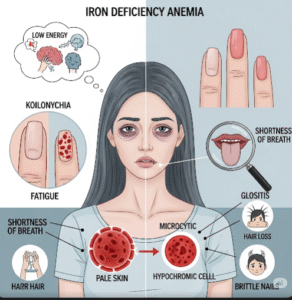Overview
Cognitive impairment refers to a decline in mental functions such as memory, attention, language, and problem-solving skills, which can affect daily life. It may be mild, moderate, or severe, and can result from aging, neurological diseases, brain injury, or other medical conditions. In Korea, hospitals and specialized clinics provide advanced diagnostics, cognitive rehabilitation, medication, and supportive therapies to help individuals manage cognitive impairment effectively, improving quality of life and maintaining independence.
Key Facts
▶ Prevalence: Common in older adults, especially those over 65; can also affect younger individuals due to injury or medical conditions.
▶ Causes: Alzheimer’s disease, vascular dementia, traumatic brain injury, stroke, infections, or metabolic disorders.
▶ Associated Symptoms: Memory loss, confusion, difficulty concentrating, poor judgment, and language difficulties.
▶ Treatment Options in Korea: Cognitive training, medications, lifestyle interventions, and multidisciplinary support.
▶ Importance: Early diagnosis and intervention can slow progression and improve daily functioning.
What is Cognitive Impairment?
Cognitive impairment is a condition where an individual experiences a decline in one or more cognitive domains:
▶ Mild Cognitive Impairment (MCI): Noticeable changes that do not significantly interfere with daily life.
▶ Dementia: Progressive decline that affects independence and daily activities.
▶ Memory Impairment: Difficulty remembering recent events or information.
▶ Executive Function Decline: Problems with planning, organizing, or decision-making.
▶ Attention Deficits: Difficulty focusing or sustaining attention on tasks.
Note: Cognitive impairment is not a single disease but a symptom of various underlying conditions, which makes proper evaluation essential.
What Symptoms Are Related to Cognitive Impairment?
▶ Memory Loss: Forgetting appointments, names, or familiar tasks.
▶ Disorientation: Confusion about time, place, or events.
▶ Difficulty Concentrating: Trouble following conversations or completing tasks.
▶ Language Problems: Struggling to find words or understand instructions.
▶ Poor Judgment or Problem Solving: Challenges in making decisions or managing finances.
▶ Behavioral Changes: Mood swings, irritability, anxiety, or depression.
▶ Difficulty Performing Daily Activities: Problems with cooking, dressing, or managing hygiene.
▶ Social Withdrawal: Reduced participation in social activities due to cognitive challenges.
What Causes / Possible Causes
Cognitive impairment can result from neurological, medical, psychological, or lifestyle-related factors:
▶ Neurodegenerative Diseases: Alzheimer’s disease, Parkinson’s disease, and frontotemporal dementia.
▶ Vascular Causes: Stroke, transient ischemic attacks, or chronic small vessel disease.
▶ Traumatic Brain Injury: Concussions or severe head injuries.
▶ Infections: Encephalitis, meningitis, or HIV-related cognitive decline.
▶ Metabolic Disorders: Thyroid disease, vitamin B12 deficiency, or diabetes.
▶ Medications: Certain sedatives, antihistamines, or chemotherapy drugs.
▶ Psychological Factors: Depression, anxiety, or chronic stress.
▶ Lifestyle Factors: Poor sleep, alcohol or substance abuse, or lack of mental stimulation.
Note: Multiple factors can coexist, making a comprehensive evaluation critical for effective management.
When Should I See a Doctor?
▶ Memory Decline Affecting Daily Life: Difficulty managing finances, medications, or routine tasks.
▶ Behavioral or Personality Changes: Sudden irritability, apathy, or social withdrawal.
▶ Confusion or Disorientation: Frequently getting lost or unable to follow familiar directions.
▶ Language Difficulties: Struggling to communicate clearly.
▶ Mood Changes: Depression or anxiety accompanying cognitive decline.
▶ Rapid Symptom Progression: Quick deterioration of memory or thinking skills.
▶ Traumatic Event or Illness: Following head injury, stroke, or infection.
▶ Family History: Increased risk due to hereditary conditions like Alzheimer’s disease.
Tip: In Korea, neurologists, geriatric specialists, and neuropsychologists offer comprehensive assessments to determine the type, severity, and cause of cognitive impairment.
Care and Treatment
Management focuses on slowing progression, improving function, and supporting daily life:
▶ Cognitive Rehabilitation: Structured exercises to enhance memory, attention, and problem-solving skills.
▶ Medications: Cholinesterase inhibitors or NMDA receptor antagonists for certain neurodegenerative conditions.
▶ Lifestyle Interventions: Regular physical activity, mental stimulation, and social engagement.
▶ Nutritional Support: Balanced diet rich in antioxidants, vitamins, and omega-3 fatty acids.
▶ Sleep and Stress Management: Adequate rest and relaxation techniques to support cognitive health.
▶ Behavioral Therapy: Address mood changes, agitation, or anxiety.
▶ Caregiver Support: Training for family members to provide effective assistance and monitoring.
▶ Assistive Devices: Memory aids, reminder apps, or environmental modifications.
Treatment Options in Korea
Medical Evaluation:
▶ Neurological Assessment: Brain imaging (MRI, CT) and neurological exams.
▶ Neuropsychological Testing: Detailed assessment of memory, attention, and executive function.
▶ Laboratory Tests: Blood tests to detect metabolic, infectious, or vitamin deficiencies.
▶ Genetic Testing: For inherited forms of dementia when appropriate.
Advanced Therapies:
▶ Pharmacologic Treatments: Medications to slow cognitive decline in Alzheimer’s or vascular dementia.
▶ Cognitive Training Programs: Structured mental exercises provided in hospitals or rehabilitation centers.
▶ Multidisciplinary Care: Collaboration among neurologists, psychiatrists, nutritionists, and physiotherapists.
▶ Supportive Technologies: Memory apps, reminder systems, or smart home devices for daily functioning.
Rehabilitation & Support:
▶ Patient Education: Guidance on coping strategies, cognitive exercises, and lifestyle modifications.
▶ Family Counseling: Support for caregivers on managing challenging behaviors and planning long-term care.
▶ Follow-Up Care: Regular monitoring to track cognitive changes and adjust treatment.
▶ Specialist Clinics: Korean hospitals offer comprehensive neurocognitive clinics integrating diagnostics, therapy, and support services.
Outcome: With early diagnosis, comprehensive care, and multidisciplinary interventions in Korea, cognitive impairment can be effectively managed, improving memory, daily functioning, and overall quality of life.













